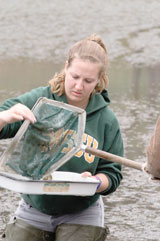Biology pond may become Oriental garden

Carolyn White, freshman biology major, fishes for salamanders in the Biology Pond Feb. 22.
During the March 31 Board of Governors meeting, the idea of creating an oriental garden out of the Biology Pond came to light.
University President Julio León said the idea originally started with a donation from a former Board of Regent member.
The donation went to dedicate and build the bridge over the pond.
“In memory of his son, he gave us money to beautify the campus,” León said. “This could be a very pretty area.”
He said the plans are not definite, and there is no timetable.
Dr. Scott Wells, head of biology, said he did not know about the plans.
“Since I don’t have the exact plans, I don’t know what to say,” Wells said.
Wells said he is concerned about the native species in the pond should it be converted to a garden.
“The pond is a huge asset to our students,” he said.
León said if the pond area is converted to an oriental garden, the pond itself would remain intact.
He said he saw no reason to take from what the biology department had.
The pond serves as a place for field research to the biology department.
“It’s used by a number of biology classes,” Wells said. “In essence, it is a field laboratory. I don’t know of many other schools that have that.”
Wells said he considers the pond important for students because of the hands-on approach.
León said the garden is still in the planning stages.
“This goes hand-in-hand with the mansion restoration,” he said.
León said several things will be taken into consideration including the native plants and species around the pond.
He said he did not believe the pond would be effected, but the area around it would be added to, including possible oriental lamps and several walking trails.
He said maintenance would do most of the work, but the work would be directed through outside recommendations.
“I would hope they would add input from biologist,” Wells said.
Wells said an ideal solution would be if the pond itself is not touched and can still be utilized by the department.
He said bringing foreign fish or species into the environment would be detrimental to the department.
“It would destroy that ecosystem,” he said. “We are fortunate to have it on this campus.”
León said all items would be taken into consideration before the work is undertaken.
“They will still be able to use it for their department,” he said.
León and Wells said the biology pond is a place to bring in prospective students.
“It will be a place where students can study, meditate and think,” León said.
Wells said he points out to new students the field research and class work, which occurs at the pond. He said the unique features of the pond’s ecosystem such as rare species and spring-fed life make it good for student consideration.
“It’s a great recruiting tool,” he said.
Should any change to the pond’s current state take place, the Board will have to approve it.
Your donation will support the student journalists of Missouri Southern State University. Your contribution will allow us to purchase equipment and cover our annual website hosting costs.



























